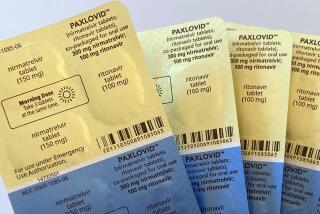Study Doubts Early AZT Use Prolongs Life
Starting treatment with the drug AZT early in the course of infection delays the development of AIDS in many HIV-infected patients but does not increase life span any more than starting the drug after symptoms worsen, according to a national research study.
The findings, being published today in the New England Journal of Medicine, dissent from the conventional recommendation that all individuals infected with the human immunodeficiency virus receive AZT as soon as they have laboratory evidence of significant immune system problems.
The results are likely to disappoint many HIV-infected individuals, who have counted on AZT to prolong their lives until better treatments become available.
For “long-term clinical benefits as measured by survival, there is no difference in those treated early versus those treated later,” said Dr. John D. Hamilton of the Veterans Affairs Medical Center in Durham, N.C., the principal author of the study. “We wish this result was not the case, but it is.”
Moreover, while the study did support previous findings that AZT seems to delay the onset of full-blown AIDS, it found that once they developed AIDS, the early-therapy patients tended to be sicker and have more AIDS-related problems.
Only patients with HIV symptoms were included in the study. But the researchers said it was likely that their findings applied to asymptomatic individuals as well.
The new study differs from prior trials of the early use of AZT in that it measured overall survival, not just the time to the development of AIDS. These prior studies supported the effectiveness of early AZT therapy.
In an interview, Hamilton said the new results likely reflect a combination of factors, such as the development of resistance to AZT, the relentless deterioration seen in the disease and side-effects of the drug, such as anemia.
He said that while the decision about when to start AZT should be individualized, other aspects of early care remain very important, such as medications to prevent the development or tuberculosis or AIDS-related pneumonia.
The four-year Veterans Affairs Cooperative Study involved seven VA Medical Centers, including the hospitals in West Los Angeles and San Francisco. The researchers followed 338 HIV-infected patients. The patients were randomly assigned to early AZT therapy or late treatment.
After a typical follow-up period of two years or more, there were 23 deaths in the early-therapy group and 20 deaths in the late-therapy group, a difference that was not statistically significant, according to the study. AZT also appeared to be less effective in blacks and Hispanics, a study finding that was publicized in 1991.
The patients were almost all men, with early HIV symptoms such as yeast infections of the mouth, weight loss, diarrhea or fever. When entering the study, their concentrations of the key immune system cell, known as CD4 or T4, were between 200 and 500 per cubic millimeter of blood.
Most physicians recommend AZT when their patients’ CD4 counts fall below 500. A normal level is between 800 and 1200.
The early treatment patients received AZT immediately. The late treatment patients initially received a placebo; they were switched to AZT when their CD4 cell counts fell below 200 or when they developed AIDS.
In the early-therapy group, 28 patients progressed to AIDS, compared to 48 patients in the late-therapy group. But there was little difference in the median time from the diagnosis of AIDS to death in the early-therapy group (16 months), and the late therapy group (19 months).
HIV disease has several stages. Most patients do not become ill until at least several years after infection. First symptoms may be mild, such as fatigue or fever. Later, life-threatening problems such as brain infections, tumors and pneumonia usually develop.
AIDS physicians not connected with the trials said they were uncertain if the VA study would change medical practice.
“I don’t think (delaying AZT treatment) is going to be an acceptable strategy for many patients,” said Dr. Harry Hollander of the UC Medical Center in San Francisco.
In an editorial on the study for the New England Journal, Dr. Lawrence Corey and Thomas R. Fleming of the University of Washington in Seattle said the results highlight “the necessity of developing better therapies for advanced HIV infection.” They wrote: “The war on AIDS will be an extended one, and drug therapy for HIV infection is only in its infancy.”





